Daily Vocabulary Words: List of Daily Used Words in Leading International Newspapers
Hi there. Welcome to this special section @ Wordpandit.
Our endeavour here is very simple: to highlight important daily vocabulary words, which you would come across in leading newspapers in the country. We have included the following newspapers in our selection:
• The New York Times
• The Washington Post
• Scientific American
• BBC
• The Guardian
• Psychology Today
• Wall Street Journal
• The Economist
We are putting in extensive work for developing your vocabulary. All you have got to do is be regular with this section and check out this post on a daily basis. This is your repository of words that are commonly used and essentially, we are posting a list of daily used words. Hence, this has significant practical application as it teaches you words that are used commonly in leading publications mentioned above.
Visit the website daily to learn words from leading international newspapers.
WORD-1: Omnipresence
CONTEXT: A large part of West’s celebrity for the past decade has been his sheer omnipresence.
SOURCE: Guardian
EXPLANATORY PARAGRAPH: Omnipresence means being present everywhere at the same time. It’s like when you imagine a superhero who can be in many places all at once.
MEANING: Being present everywhere at the same time (noun).
PRONUNCIATION: OM-nuh-PREZ-uhns
SYNONYMS: ubiquity, pervasiveness, omnipresence, all-presence, everywhere
USAGE EXAMPLE:
1. The internet’s omnipresence has changed how we communicate.
2. The artist’s work reflects the omnipresence of technology in modern life.
3. His influence in the industry is characterized by omnipresence.
4. The company’s advertising campaign aimed for omnipresence across media platforms.
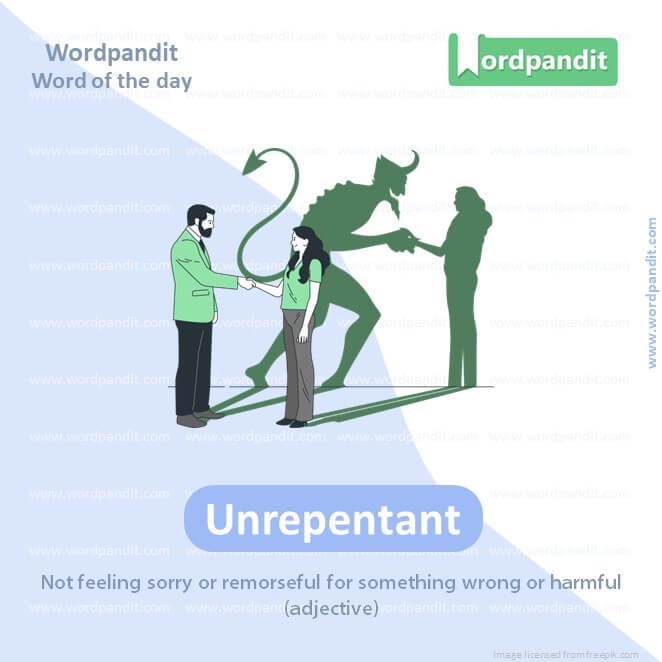
WORD-2: Unrepentant
CONTEXT: The general public doesn’t really care about an artist’s misdeeds if the art is still passable, no matter how unrepentant they might be.
SOURCE: Guardian
EXPLANATORY PARAGRAPH: Unrepentant means not feeling sorry or remorseful for something wrong or harmful. It’s like when someone doesn’t apologize even when they know they did something bad.
MEANING: Not feeling sorry or remorseful for something wrong or harmful (adjective).
PRONUNCIATION: un-ri-PEN-tuhnt
SYNONYMS: impenitent, remorseless, unapologetic, unabashed, shameless
USAGE EXAMPLE:
1. Despite his mistakes, he remained unrepentant.
2. The criminal was unrepentant during his trial.
3. She showed an unrepentant attitude towards her actions.
4. The leader’s unrepentant stance caused controversy.
WORD-3: Wringing
CONTEXT: MJ, a new musical sanctioned by Jackson’s estate that’s currently playing in London’s West End, is a commercial success – suggesting that audiences aren’t exactly wringing their hands over celebrating the singer’s legacy.
SOURCE: Guardian
EXPLANATORY PARAGRAPH: Wringing means squeezing or twisting something forcefully, like when you wring out water from a wet cloth.
MEANING: Squeezing or twisting something forcefully (verb).
PRONUNCIATION: RING-ing
SYNONYMS: squeeze, twist, wring out, compress, press
USAGE EXAMPLE:
1. She was wringing out the water from the wet towel.
2. Wringing his hands, he waited nervously for the results.
3. The wrestler used a technique of wringing his opponent’s arm.
4. Wringing the excess moisture from the sponge, she cleaned the counter.
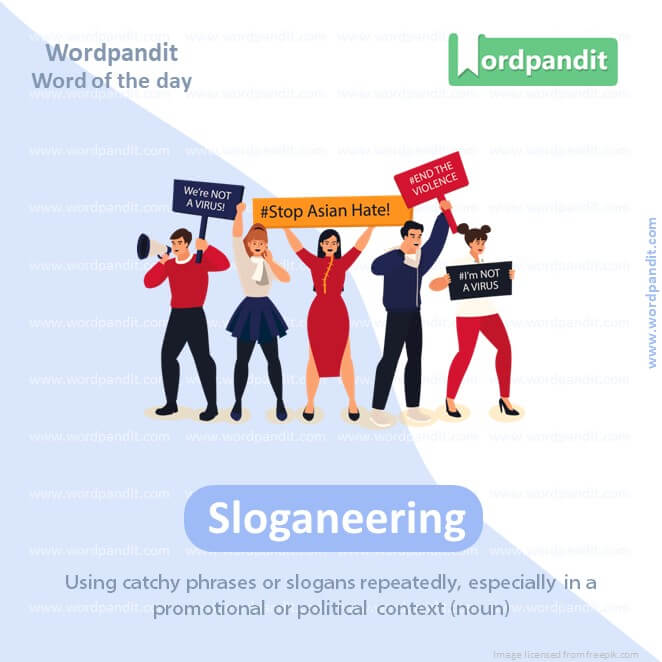
WORD-4: Sloganeering
CONTEXT: I don’t think he was setting out to expose the shortcomings of the over-centralised British state. But it is exactly what his knack for superficial sloganeering has done.
SOURCE: Guardian
EXPLANATORY PARAGRAPH: Sloganeering refers to the practice of using catchy phrases or slogans repeatedly, often in a promotional or political context.
MEANING: Using catchy phrases or slogans repeatedly, especially in a promotional or political context (noun).
PRONUNCIATION: SLO-gan-EER-ing
SYNONYMS: sloganizing, catchphrase usage, repetitive phrases, promotional rhetoric, tagline repetition
USAGE EXAMPLE:
1. The politician’s campaign relied heavily on sloganeering.
2. The marketing team brainstormed new slogans for their advertising sloganeering.
3. Sloganeering can be effective in capturing public attention.
4. Critics accused the company of shallow sloganeering without substantial actions.
WORD-5: Incongruous
CONTEXT: As incongruous as it seems, this moment is central to understanding the book on which the show is based.
SOURCE: Guardian
EXPLANATORY PARAGRAPH: Incongruous means not in harmony or not fitting well with something else. It’s like when you wear mismatched socks that don’t go together.
MEANING: Not in harmony or not fitting well with something else (adjective).
PRONUNCIATION: in-KONG-groo-us
SYNONYMS: inappropriate, out of place, mismatched, discordant, unharmonious
USAGE EXAMPLE:
1. His jokes seemed incongruous with the seriousness of the meeting.
2. The modern architecture looked incongruous among the historic buildings.
3. Her outfit was incongruous for the formal event.
4. The music choice felt incongruous with the mood of the scene.
WORD-6: Hounded
CONTEXT: An estimated two million people died, from top political leaders to infants. Tens of millions more were hounded.
SOURCE: Guardian
EXPLANATORY PARAGRAPH: Hounded means being persistently pursued or harassed, like when someone won’t leave you alone even when you want them to stop.
MEANING: Being persistently pursued or harassed (adjective).
PRONUNCIATION: HOWN-did
SYNONYMS: pursued, harassed, chased, dogged, bothered
USAGE EXAMPLE:
1. She felt hounded by reporters after the scandal broke.
2. The company was hounded by lawsuits for years.
3. The politician was hounded by allegations of corruption.
4. Hounded by creditors, he struggled to keep his business afloat.
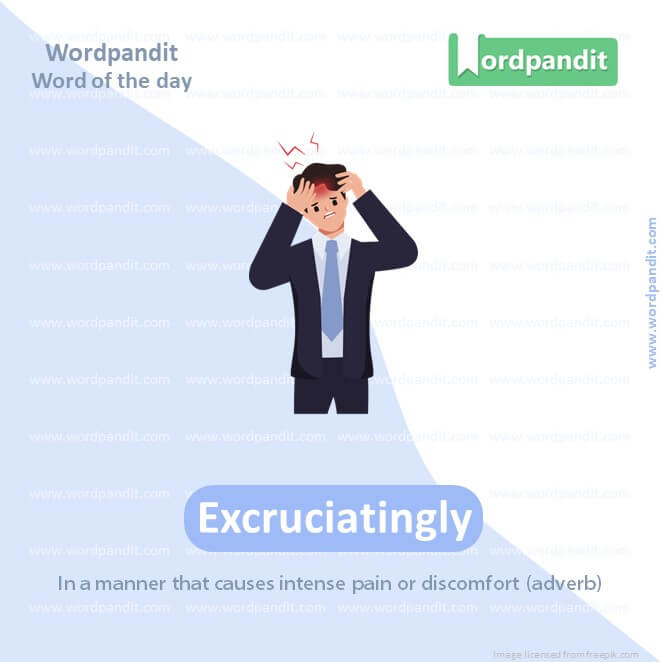
WORD-7: Excruciatingly
CONTEXT: The humiliating dunce caps placed on victims’ heads and the excruciatingly painful “airplane” position that they were forced into: bent double with arms held out behind them.
SOURCE: Guardian
EXPLANATORY PARAGRAPH: Excruciatingly means extremely painful or intensely distressing. It’s like when you have a toothache that makes your whole face hurt.
MEANING: Ina manner that causes intense pain or discomfort (adverb)
PRONUNCIATION: ik-SKROO-shee-ay-ting-lee
SYNONYMS: agonizingly, intensely, severely, terribly, extremely
USAGE EXAMPLE:
1. The patient described the pain as excruciatingly intense.
2. She waited excruciatingly long for the test results.
3. The silence in the room became excruciatingly uncomfortable.
4. The movie’s ending was excruciatingly sad.
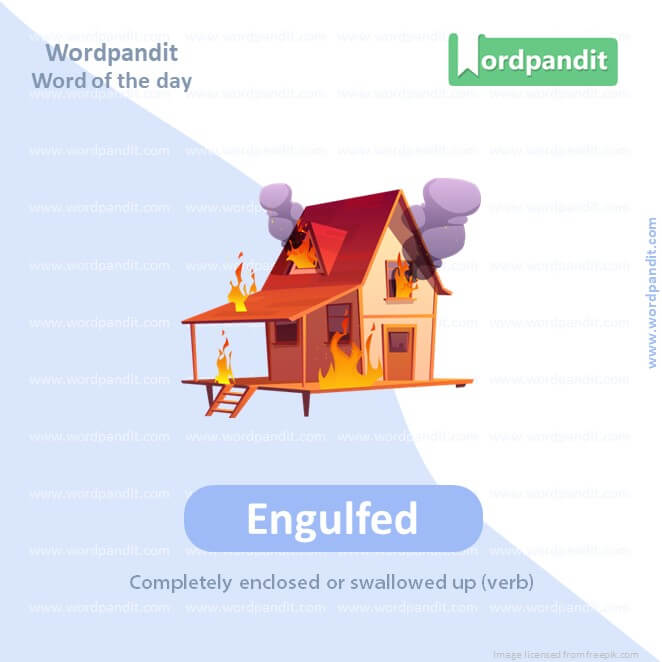
WORD-8: Engulfed
CONTEXT: As a young child, he was sent away to grandparents when his parents’ workplace was engulfed by fighting between warring factions.
SOURCE: Guardian
EXPLANATORY PARAGRAPH: Engulfed means completely surrounded or immersed by something, like when a wave engulfs a sandcastle on the beach.
MEANING: Completely enclosed or swallowed up (verb)
PRONUNCIATION: en-GUHLD
SYNONYMS: surrounded, immersed, enveloped, consumed, overwhelmed
USAGE EXAMPLE:
1. The building was engulfed in flames.
2. She felt engulfed by a sense of loneliness.
3. The city was engulfed by a thick fog.
4. His thoughts were engulfed by memories of the past.
WORD-9: Cynicism
CONTEXT: Survivors I have met remain deeply scarred by what they witnessed, what was done to them and what they did to others. Those years bred profound cynicism and fear.
SOURCE: Guardian
EXPLANATORY PARAGRAPH: Cynicism is a belief that people are motivated purely by self-interest, distrust, or skepticism about human nature. It’s like when someone thinks everyone is always trying to cheat or take advantage of others.
MEANING: Belief that people are motivated purely by self-interest or distrust in human nature (noun).
PRONUNCIATION: SIN-uh-siz-uhm
SYNONYMS: skepticism, distrust, disbelief, pessimism, suspicion
USAGE EXAMPLE:
1. His cynicism made it hard for him to trust anyone.
2. Cynicism about politics is common among young voters.
3. She approached the offer with a healthy dose of cynicism.
4. His cynical comments about love reflected his overall worldview.
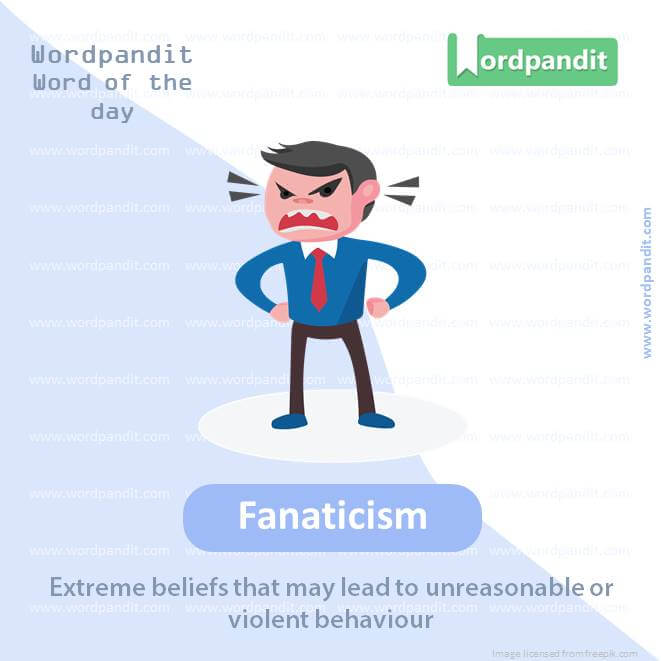
WORD-10: Fanaticism
CONTEXT: The Cultural Revolution is just a story of youthful fanaticism, human unreason, and weakness.
SOURCE: Guardian
EXPLANATORY PARAGRAPH: Fanaticism is extreme enthusiasm or zeal for a particular belief or cause, often to the point of being unreasonable or excessive. It’s like when someone is so passionate about their favorite sports team that they paint their entire room in their team’s colors.
MEANING: Extreme beliefs that may lead to unreasonable or violent behaviour.
PRONUNCIATION: fuh-NAT-uh-siz-uhm
SYNONYMS: extremism, zealotry, fervor, passion, obsession
USAGE EXAMPLE:
1. His fanaticism for environmental causes led him to activism.
2. The group’s fanaticism bordered on extremism.
3. Religious fanaticism has caused conflicts throughout history.
4. Her fanaticism for fitness led her to train for marathons regularly.
Vocabulary list
In navigating the seas of language learning, a ‘vocabulary list’ can often be a dependable guiding star. These collections of words serve as a focused learning tool, yet the technique of mastering a ‘vocabulary list’ effectively requires more than simple perusal. It calls for a smart, sustained approach that amalgamates understanding, memory, and application.
Exploring a ‘vocabulary list’ should be more than a one-way trip. It ought to be more like a round trip, wherein you learn the words, come back to review them, and then set out again for a new voyage. This repeated interactive way of exploring the ‘vocabulary list’ aids in solid memory retention and effective learning.
Next, while dealing with a ‘vocabulary list’, employing memory-boosting techniques can bolster your retention substantially. Here, mechanisms like spaced repetition systems and flashcards can simplify and streamline the process. Moreover, associating words on your ‘vocabulary list’ with visual cues or personal stories can help your brain make strong connections, strengthening your recall ability.
However, the most crucial aspect of learning from a ‘vocabulary list’ is active application. Conquering a list without using the words in real-world contexts might leave you with fleeting knowledge. Hence, make it a point to integrate these learnt words into your daily interactions, be it on social media, in email exchanges, or casual conversations. The regular utilization reinforces your understanding and brings the ‘vocabulary list’ to life.
Conclusively, the ‘vocabulary list’ is a treasure trove in a language learner’s quest, waiting to be unlocked strategically. Through the trinity of review, memory-enhancing techniques, and active application, one can master any ‘vocabulary list’. So, take charge of your learning journey and set sail with your ‘vocabulary list’, charting the vast and fascinating seas of language.







